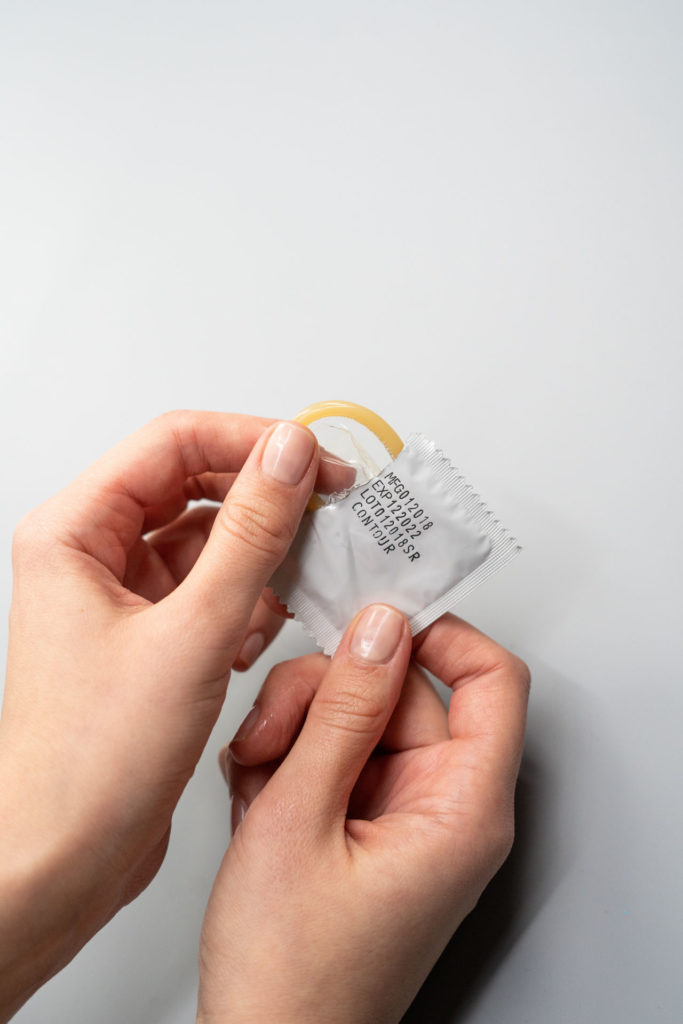The basic rules about protection and how to take responsibility for your own sexual health
The healthiest relationships, and sex lives, are built on mutual respect and education around how to protect your health and enjoy sex without worry – regardless of your relationship status or the number of sexual partners you choose. You have the right to keep your bits and pieces infection and baby free – but it takes some management and a bit of honesty!
For that reason, our wellness blog series on safe sex begins with one of the most important topics; staying protected.
In this blog, we’ll discuss the different ways you can prevent passing unwanted infections between partners, and also reduce the risk of pregnancy. While although none of these methods is 100% foolproof, taking proper precautions is more important than taking none.
STDS and STIS
First up, what are they? STD stands for ‘sexually transmitted disease’, and STI stands for ‘sexually transmitted infection’. Diseases start as infections when bacteria enters the body, and once those cells multiply and start affecting the body and the way it functions, it is classed as a disease.
An STD is essentially the later stage of an STI, and more often presents itself with symptoms and needs obvious treatment, but this isn’t always the case, and many STDS can live in a body presenting no symptoms at all. That’s why regular testing is essential for sexually active adults.
STDs and STIs are not quite the big baddies we’ve all been led to believe, especially with so many easy treatments available and just how common STDs actually are in the adult population. There are different kinds of sexually transmitted infections and diseases, some of which are easily curable, while others are permanent but manageable with treatment. According to the New Zealand Health 2014/15 Survey tallying sexual behaviour and reporting of infection – one in five women and one in nine men from a sexually active group of participants reported ever being diagnosed with a sexually transmitted infection. That’s pretty steep – and those are just the ones who are actually reporting it! You can find more info on the survey’s findings in this link.
However, just because they are manageable doesn’t mean you’re lining up to catch one!
That’s why it should be a priority to protect yourself when it’s time to get down to business and to take that responsibility upon yourself. If you’re not in a committed relationship where each of your health histories is known, it’s even more important to take precautions for yourself instead of trusting someone else’s word. As much as we’d like to think every sexual partner will disclose their sexual history, it is an awkward conversation many people will avoid, unfortunately at the risk to their sexual partner.
Non-disclosure is more common in a casual setting, which has further stigmatised the conversation – as many potential partners have not been very tactful in the way they respond to STDS and infections being disclosed. If someone is going to turn around and be rude about someone disclosing their sexual history, it’s a lot less likely that that person will disclose again. That is why more education around the topic is required, and a bigger shift in the destigmatisation of these health issues.


Most people don’t know they have an STD
The rampant spread of STDS and STIS comes down to ignorance, unfortunately, as plenty of these infections DO NOT show symptoms in many people. The carrier of the infection goes about their normal sexual activities with little protection, spreading the infection further until it makes itself known through symptoms for one unlucky person who then has to try and figure out where they got it from and how to live with it now. If you have or have had sex at all in your life – it’s safest to go get tested for any STDS lurking symptomless in your body. Remember: STDS don’t just affect those who have casual sex. Getting tested for each STI is a fairly easy and straightforward process, and your GP or family health clinic does this all the time, so there’s no need to feel odd about it, and it’ll give you peace of mind.
SO many people have STDS
For example, at least half a billion people around the world are living with genital herpes, and several billion live with oral herpes, both incurable but manageable, only being infectious for a short period of time with visible sores. Basically, you just don’t get down to business when the sores are active; a small price to pay to keep your sexual partners safe from the transmission. It seems odd that disclosing this information is not a more accepted practice when you most certainly know more than one person who is living with an STD.
While some STDS are simply a nuisance and easily curable with a prescription, other infections such as chlamydia, trichomoniasis and HPV can have serious consequences for fertility in a woman if left undiagnosed and unmanaged.
The most common STDS bouncing around include HPV (Human Papillomavirus), herpes, syphilis, hepatitis, chlamydia, gonorrhoea, hepatitis, HIV and trichomoniasis.
PREGNANCY
While children are a bouncy little blessing for some, they aren’t part of everyone’s plan. Unprotected sex always carries with it the risk of conceiving children. Do not believe anyone who tells you otherwise. The pull-out method is shady, at best, and different positions do not reduce the strength of a sperm’s journey towards an egg. Even women who track their cycles and swear they are not ovulating may not be correct about that, as cycles are rarely 100% reliable. As Dr Malcolm famously stated, “life finds a way”. If you don’t want kids, you need to use contraception.
PREVENTION
Prevention is the best protection against both unwanted infections and pregnancies. And there are tonnes of options, some of which are free at your local family planning clinic and won’t mess with your hormonal makeup.
CONDOMS
Easily the most popular and accessible barrier method of contraception. One of the best things about condoms is that both men and women can easily buy them without any questions and have them as part of their protection plan. You can nip into any convenience store, chemist or supermarket and stock up – making it the best for last-minute plans.
Condoms are worn over the penis before intercourse, are suitable for all kinds of intercourse and are a hardy barrier to help protect against both infections and pregnancy. They also have no side effects, with the exception of a latex allergy, for which there are latex-free options readily available. So really, there’s no excuse not to use one, particularly in a casual setting.
HORMONAL CONTRACEPTION (A.K.A The Pill)
A popular choice amongst women as the pill is 99% effective against pregnancy when taken reliably; however, it will not protect you from catching sexually transmitted diseases, so if you want complete protection, you will need to also use barrier contraception as well.
There are two common types of hormonal contraception, the combined oral contraceptive pill and the progesterone-only pill. Both work differently, and you can talk to your GP about which one is best for you and your health. Taking any kind of hormonal contraception can have adverse effects, as the pill works by preventing you from releasing an egg (ovulating), affecting your hormones. Talk to your healthcare provider for the full information so that you can make an informed choice about whether or not the hormonal pill is for you.
INTERNAL CONDOMS (FEMALE CONDOMS)
A female condom works the same way a traditional one does, except it is inserted inside the vagina before intercourse and catches semen from entering the vulva. It is made out of nitrile polymer and is naturally latex-free, so can be used by someone with a latex allergy. This is a less popular barrier contraceptive than traditional condoms, but is worth exploring if regular condoms are not suitable for whatever reason. There is also a thing called a dental dam that can be placed over a woman’s intimate areas during oral play that originated for dentistry work (hence the name).
While there are loads of different types of protection that you can use, with a bit of experimentation, you’ll land upon your favourites to always have in your essentials kit.
PSA: If you suspect you or your sexual partner are suffering from an STD, it is best to refrain from intercourse or any intimate touching for the moment. The only way to truly know if someone doesn’t have a sexually transmitted disease is to get tested for them all, as there are often no symptoms for many of the common ones. Getting tested, treated and educated about your body if it turns out you have an STD is the only way to confidently go forward with your sex life and prevent the spread of the infection further.
